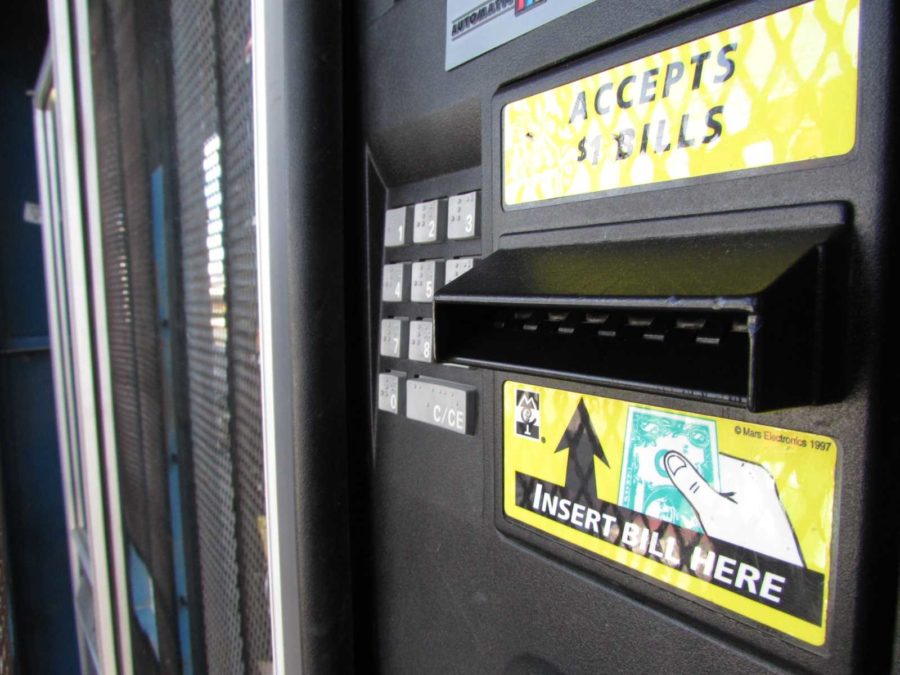Rage Against the Machine
Cam High’s vending machines, previously a highly used source of many popular snacks like Pop Tarts and Munchies, now lay dormant during the school day.
It has recently come to my and the rest of Cam High’s attention that the vending machines, which were previously functional all day, on campus are now only operational from 3:oo p.m. to midnight.
According to Mr. Steve Dickinson, Assistant Superintendent of Administrative Services for OUHSD, the machines’ prior hours of operation have been found to be in violation of the California Education Code, which states vending machines that do not dispense school-owned food cannot be operational for the duration of the school day.
This is frankly absurd. Why even have vending machines in the first place if they aren’t going to be on during the only times that the students would use them? No student would hang around campus after the school day ends simply to use the vending machines, when they can just as easily get their favorite foods and snacks at home, a convenience store, or a nearby fast-food joint.
If the school thinks that ‘locking’ the vending machines will keep students away from snack foods and lead to a healthier lifestyle, this is hardly an effective method of doing so.
However, the real issue is not about the quality or the health consciousness of the items offered in the vending machines. Dickinson stated that this new ruling has nothing to do with the nutritional content of the snacks available in the machines. “This is not an issue of what is in the vending machines. Whether the foods and beverages in the machines are ‘compliant’ does not matter,” he said in a recent email to the Cam High administrators.
“The machines cannot be on and in competition with the National School Breakfast and Lunch Programs,” read the same email.
So, what the students are eating is irrelevant. Instead, the major concern is who they are buying their food from. The real motivation behind Cam High’s recent installment of timed vending machine use is to attract more student buyers to the school lunch program. According to the California Department of Education’s website, a school can receive a $2 reimbursement for every breakfast sold and a $3.50 reimbursement for every lunch.
Now, generating additional income for the school can be viewed as a positive change. Raising money for our already under-funded, over-crowded Cam High is a good thing, right? Right- but as in most cases, the marginally greater earnings come at a price.
The school is essentially forcing students- ravenous teenagers who would normally buy a snack from the vending machine- to wait until noon to eat a school-provided lunch. But what if you’re hungry? Is it the state’s right to tell you what you can and cannot eat? Is it within its realm to dictate an exact timetable of when you are allowed to eat?
Whether or not the district is truly putting “students first: every day, every school, every classroom,” as their motto proclaims, is questionable in regards to the shutting down of these machines.
Students are not the only ones who are unhappy with the change. Several teachers are also upset with the new controls, including Mr. Chris Quinn, social science teacher. “It’s a decision being made for economic reasons in order for the school district to make more money from food sales,” he said. “I think that vending machines with water should be on at least.”
The vending machine issue, while upsetting in itself, is a representation of a much larger problem. While the OUHSD expects the students to trust them with their education, they in turn place very little trust in the students. School officials are quick to flaunt their student’s high test scores, various “distinguishing” awards, or winning sports teams, yet the district and the state of California don’t even trust students enough to eat right on their own without bureaucrats telling them what to eat.
This is just the latest of many other examples of flagrant distrust in the student population. Within the last couple of years, copious Internet restrictions, random metal detection tests, and the banning of off-campus passes have become accepted as normal regulations. While the district’s control over minute details of student’s lives increase, the students themselves are still being treated like toddlers, whose parents have to hide the cookie jar lest they spoil their dinner.
The students of Cam High are going to become legal adults soon enough, and when they do enter the real world, they won’t have anyone over their shoulders telling them what they can and cannot eat. Most, if not all, students have grasped the concept of what food is deemed acceptable and when it is appropriate to eat said food. And regarding those few who have not, it is not the state’s place to police the liberties of the entire student body for the sake of a fractional minority.

Hi, I'm Sam Falconer. I'm a senior this year, so, yeah. Anyway, I am a film connoisseur and an avid reader and writer. I am also a lover of all things...

















































































![Senior Ditch Day... Relaxation or Truancy? [Video]](https://achsstinger.com/wp-content/uploads/2017/10/IMG_7119-900x599.jpg)
![Heavy Rain Hits Cam High [video]](https://achsstinger.com/wp-content/uploads/2017/02/maxresdefault-900x506.jpg)



